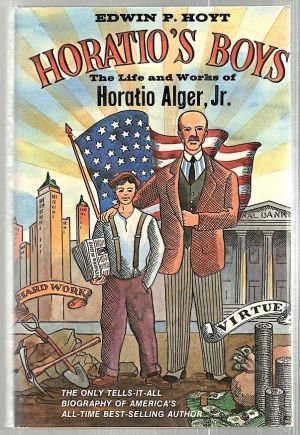Horatio Alger

Horatio Alger Jr. (January 13, 1832 – July 18, 1899) was an American author who wrote young adult novels about impoverished boys and their rise from humble backgrounds. His writings were characterized by the "rags-to-riches" narrative, which had a formative effect on the United States during the Gilded Age.[1] Alger published children's literature throughout his life, emphasizing the values of hard-work, honesty, charity, and altruism. The Horatio Alger Association of Distinguished Americans continues this legacy by offering scholarships to prospective students, dedicated "to the simple but powerful belief that hard work, honesty and determination can conquer all obstacles".[2]
The biography Horatio’s Boys: The Life and Works of Horatio Alger[3] (1974) was reviewed by the MAP ally historian Hubert Kennedy (The Advocate, May 1984), revealing details about Alger as a boy-lover.[4] Kennedy wrote:
It may well be, as San Francisco gay historian Allan Bérubé has said, that Horatio Alger Jr. (1832–1899) was “19th-century America’s most prominent boy lover.” Author of over 100 books for boys, Alger is perhaps the best-selling author of all time in America. That Alger was a boy lover was not publicly revealed, however, until 1971. [...] A graduate of Harvard College (1852) and the Harvard Divinity School (1860), Alger was minister of the Unitarian Church in Brewster (Cape Cod), Mass., for only 15 months, his position being abruptly terminated in March 1866 by the revelation of a three-man investigating committee that he was guilty of “a most heinous crime, a crime of no less magnitude than the abominable and revolting crime of unnatural familiarity with boys.” Alger was presented with the charge and the evidence of his guilt, “which he neither denied nor attempted to extenuate but received with the apparent calmness of an old offender,” though he did admit “that he had been imprudent.” The committee reporting to the American Unitarian Association in Boston added that he “hastily left town on the next train for parts unknown—probably Boston.” Instead, Alger went on to New York, determined to continue his writing career, which had begun while he was still an undergraduate. With the publication in 1867 of the popular Ragged Dick, Alger’s success was assured.

In 1986, NAMBLA gave a colloquial and somewhat crude description of Alger in a list of "15 famous men who loved boys":
As pastor of the Unitarian Church in Brewster, Massachusetts, he befriended many of the local boys and took them on afternoon seaside picnics, which, to the outrage of the community, turned out to be mini-orgies in the dunes. When the truth came out, Alger was arrested and run out of town.[5]
Alger's most famous novel, Ragged Dick: Or, Street Life in New York With the Bootblacks (1867), can be read online here.[6]
See also
References
- ↑ This article combines original research and information from Wikipedia. See Horatio Alger. See also, Britannica
- ↑ https://horatioalger.org/
- ↑ Horatio’s Boys: The Life and Works of Horatio Alger
- ↑ https://docslib.org/doc/12028799/hubert-kennedy-reviewing-boy-love-and-nambla
- ↑ NAMBLA: Famous Men
- ↑ Alger - Ragged Dick book PDF